This week we started a new chapter in the “Food and Power” course, focusing this month on the question “What is edible?” by examining debates about GM foods, mad cow anxieties, and vegetarian campaigns against meat-eating. I opened with a lecture on the usual interest this topic raises in food studies – food taboos; however, I focused on a slightly unconventional aspect of it, the role of disgust. The reason I wanted my students to think about disgust was because of how it is both something experienced physically, and yet clearly also a mental process. We can imagine ways that a mental thought that disturbs us can cause a physiological reaction (our stomach drops); and, conversely, how a physical reaction, nausea at a off-putting smell, for example, can lead to a psychological reaction (moral disgust). Disgust is therefore a wonderful way to explore the intertwined nature of biology and culture, a subject of great interest to STS scholars, which sidesteps tendencies towards simple biological or cultural reductionism.
I screened for my class this infamous live octopus eating scene from the
Korean film Oldboy (2013), to ask whether Sannakji (산낙지) was “disgusting”.
My own entry into the world of food and disgust is guided by the work of Paul Rozin, professor of psychology at the University of Pennsylvania, and the person who first theorized the concept of “the omnivore’s dilemma”, later plagiarized popularized by Michael Pollan. Rozin and his colleagues argue that, while many animals are food specialists and are therefore born knowing what to eat (curious fact: vampire bats have a substantially reduced sense of taste because all they eat is blood), humans as omnivores have to learn what is good or bad to eat. We gain the advantages of flexibility and adaptability to new environments, but at the cost of being exposed to potential new toxins or suffering unanticipated nutritional imbalances – what he so wonderfully calls “fearful interest”. (If you would like to read more about Rozin and his work, check out this interview, and I highly recommend the article “Why We Eat What We Eat, and Why We Worry About it”.)
Rozin argues that disgust is learned as a mechanism to temper food novelty or thrill-seeking, thereby reducing our risk. It is thus both cultural, in that it is learned, and biological, in terms of motivation and experience. (One point of evidence he offers is how feral humans raised alone in the wild do not exhibit disgust.) When studying disgust across cultures, they find that there is “universalism without uniformity”: all human cultures have some form of disgust and food taboo policing threats to the self and “body as temple”, but they reflect differences in local cultural institutions (i.e. social hierarchies, notions of purity and contaminations, etc.). Rozin’s approach allows us to explore the uneasy but significant relationship between our moral values and our justifications for disgust with certain food taboos.

I asked my students, when should we regulate from disgust? In my own studies of the FDA, I came across the so-called “Filth Guidelines“, a policy where the FDA would close a company for failing standards of hygiene even when there was no explicit health violation. We can think of germ theory reasons for wanting restaurant workers to wash their hands before handling food, but mostly it is just disgusting to us that they might not. What activities should be left to personal opinion and what disgusting habits warrant institutional policing?
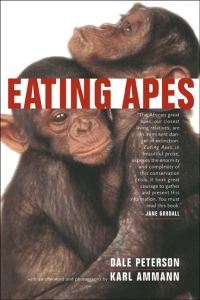
Dale Petersen’s very thought-provoking book Eating Apes, about the problems with bushmeat markets in Africa.
I chose the readings for this week to be a bit provocative, to see if I could get myself and my students “out of our comfort zone”. For this reason I had them read two pieces: Emily Anthes’s ‘modest proposal’ in The Guardian that we all learn to eat insects as a solution to the “Malthusian trap”: “How Insects Could Feed the World”; and “Chapter 4: Flesh” from Dale Peterson‘s excellent book Eating Apes. In Korea, many people eat silk worms as street food (“Beondegi”), so I imagined this would be an opportunity for the students to laugh at my squeamishness, and to explain to me why I should get over it, in the name of diversify my tastes and thereby saving the planet.
Indeed, my Korean students were less bothered than most Americans with the idea of discovering a bug in their produce, indicating it was a good sign that the vegetables hadn’t been overdosed with chemicals. On the other hand, they would agree it’s disgusting to find a bug in one’s food at a restaurant, or even to spill their drink on their food… even if “it’s all going to the same place”. (I used this as an opportunity to discuss Mary Douglas‘s famous definition of “dirt” as “matter out of place”, a fundamentally culture-based definition.) This got us speculating as to whether artificially and excessively sterile environments, or particularly narrow diets (i.e. American fast food), might cultivate an especially sensitive disgust-prone person. (On one slide I had put large images of Hitler and a cockroach, two stimuli that Rozin said provoked the strongest reactions of disgust in his western subjects. My students weren’t especially bothered by it. I think I would have had Americans squirming at the cockroach image.)
Not surprisingly, however, students willing to eat the familiar Beondegi Korean street food, balked at the idea of many of the insects proposed in Anthes’s article. (As good environmentalists and experimentalists, they were, however, intrigued by the idea of using insects as an ingredient, instead eating whole bugs.) I went around the room and asked students to describe when they first tried Beondegi, and what they thought of it. Many described being tricked into eating it as kids, without knowing it was an insect. And then being told by their parents repeatedly “it’s tradition” to eat it as pressure to like it. Some admitted that they’ve stopped eating, because they still think its gross, even though the flavor was nice. At some level they were all aware of the fact that as an insect it was disgusting, and that the disgust had to be overcome.
When I asked them the same question for seafood, however, they looked at me startled. One of the students replied, “I can’t even remember the first time I ate seafood”, and the others nodded as if it was an odd question. As I Texan and formerly picky eater, I did remember. And when I told them of my story of overcoming my strong aversion to seafood, which look like sea insects, to eventually discover that I could like it, many light bulbs switched on in their heads. At this point a previously silent student had the confidence to admit that not only did she love Beondegi, but that for her it was like seafood, completely normal, nothing disgusting whatsoever. (Anthes, in her article, comments on how the example of Americans’ previous aversion to raw fish, a.k.a. sushi, is a rallying point for pro-insect-eating enthusiasts: after all, insects are just “land shrimp”.)
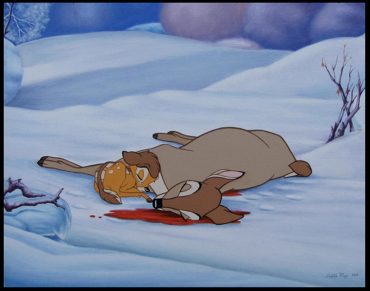
The death of Bambi’s mother scarred generations of children, stigmatizing hunting as a cruel activity. But is that just romantic sentimentalism? Why is domestic meat more ethical than game meat?
One of the student discussion leaders picked up on this issue of familiarity and nostalgia to draw a link between eating bugs and arguments made by Petersen about tradition and “cravings” for bushmeat in Africa. I assigned the reading on ape meat because I wanted a case study where my students and I were in agreement about it being taboo. I also like Petersen’s book because he includes very detailed, graphic descriptions of how the ape meat is prepared from dead, hunted corpses, including recipes and discussions about the taste for game meat versus domestically bred meat. The detail makes it very real for the reader. Once you get the students agreeing about the moral status of the ape, you can then explore the slippery slopes arguments… why eat pigs, then, which are very smart? Are horses fair game, or not? And what about man’s best friend, the dog? (More on that below.)
That moment when the professor realizes he’s getting old: I also screened
this infamous scene from Indiana Jones and the Temple of Doom (1984),
only to discover that none of my students had seen it. I used it to talk about
cross-cultural stereotyping and Orientalism, but also balancing the
ethics of whether to eat what your host serves even if
you find it morally reprehensible.
My goal in this class was not to arrive at some moral agreement about the need to “get over it” and diversify our diets, or to reach some opposite consensus that one food habit is disgusting but another not. Instead I wanted students to be conscious about the kinds of rational justifications we use to support or debunk our disgust with other people’s dietary practices. A great “teachable moment” came when a student pointed out the parallels between hunting endangered apes for meat in Africa, seen to be bad, but the tolerance of Eskimos Inuits’ traditions hunting endangered harp seals. Using a teaching trick I’ve learned from my law classes, I turned the analogy into a legal thought experiment: imagine you’re a lawyer arguing a case against eating apes in an international law court. The opposing counsel has made this claim to precedent, that previous courts have accepted Inuit hunting of an endangered animal as protected “tradition”. What counter arguments could you make that hunting apes is different? Students quickly came up with several:
- Nutrition and diet: the seal forms the center of the Inuit traditional diet, whereas ape meat is merely a special supplement. Maybe bushmeat more generally is central to their diet, but apes in particular no.
- Speculation over whether apes were keystone species, unlike seals. In other words, the ecological damage of killing apes would be greater
- Drawing on an argument from Peterson in Eating Apes, a student pointed out that bushmeat hunting in Africa is no longer subsistence, but has become commercial; unlike Inuit hunting which follows traditions that are more sustainable
Tellingly, my science and engineering students hesitated to mention what I saw as the most obvious argument against eating apes compared to seals, the moral one: 4. Unlike seals, apes are very similar to humans, and arguably are sentient and therefore deserving of similar moral protection. (We had discussed Peter Singer‘s utilitarian arguments to this effect the week before.) It never ceases to amaze me how much scientists and engineers shy away from what they see as subjective and emotional arguments, instead preferring economic or environmental appeals. But I asked them: if you had two plates in front of you —one with seal meat the other with ape meat— and had to eat one, which would you choose? They overwhelmingly chose the seal meat. When I asked them why, they admitted it was because of the moral difference. As a lawyer, I said, they had to consider the persuasive value of this moral argument in their effort to convince the judge.
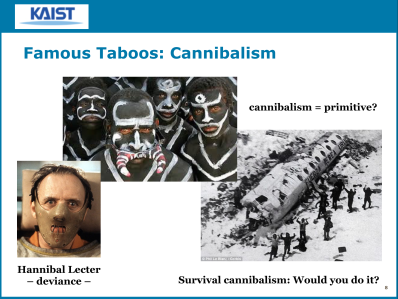
Of course we had to talk about the most famous food taboo… cannibalism. Why does it disgust us… because it’s deviant or primitive? And under what conditions could we overcome that (i.e. survival cannibalism)?
Finally, Korea is an interesting context to explore these cross-cultural dimensions to disgust and judging others for food taboos, because Korea suffers a stigma in the West by its association with eating dog meat. This is a topic which many, I suspect the majority of Koreans find embarrassing, since eating dog meat today is very uncommon here. (And Koreans can be especially self-conscious about being perceived as backwards by the West.) But a minority of Koreans do view it as “cultural” and thus legitimate. These locals could argue: foreigners, “get outside your comfort zone” and try it! Indeed, in a gesture that baffles the mind, a group of Koreans offered dog meat to the U.S. Ambassador following the recent attack on him here in Korea. (Are they really so naive about Western sentiment to not realize he would find that disgusting? He, in fact, is a proud dog owner.) Westerners, on the other hand, share horror stories on social networks about the barbarity of Koreans eating pets, laying out a variety of justifications of their disgust: dogs are pets, not food (as if specialization makes it taboo); the dogs are not bred in sterile, safe environments (really a food safety argument more than a moral one), dogs raised for meat suffer (ignoring that the same is true for pigs, cows, and other farm animals).
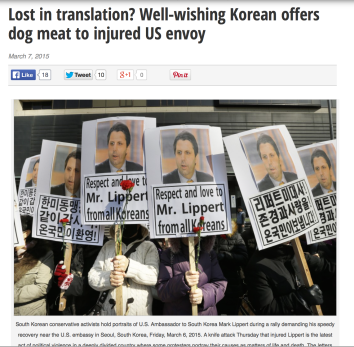
Lost in translation is right… there is a lesson somewhere in here about the importance of cross-cultural sensitivity.
I, personally, do not intend to ever try dog meat, though I withhold judgment of others who will. The heated opinions and cross-cultural judgments here remind me of another debate I lived through as an expat in Spain: bullfights. Every year American visitors would arrive to Spain and talk of having to see one, even though they agreed it was an inhumane treatment of the bull. And they were surprised that I had never gone. When I said it was because I found bullfights to be unethical, and didn’t need to experience one, they would reply: “How can you know until you try it? You should get outside your comfort zone!” Here in Korea, I can’t help but wonder what those same expats would say if confronted with dog meat soup. I can imagine efforts to differentiate disgust over one from tolerance of the other: because food is necessary whereas bullfights are unnecessary spectacle, or, because bulls are bred for this kind of treatment, but a dog is a loveable pet.
Putting aside essentializing rationales, the scholar in me can’t help but wonder, when does the tradition-defying, or global-modern ethical norm like animal rights or environmentalism triumph, and when does “it’s cultural” justify “going native” and doing as the locals do? Where would you draw the line?

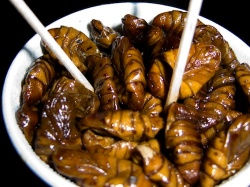
Great article. Something to really think about.
Pingback: Food and Power, an online course | Comedo Ergo Sum